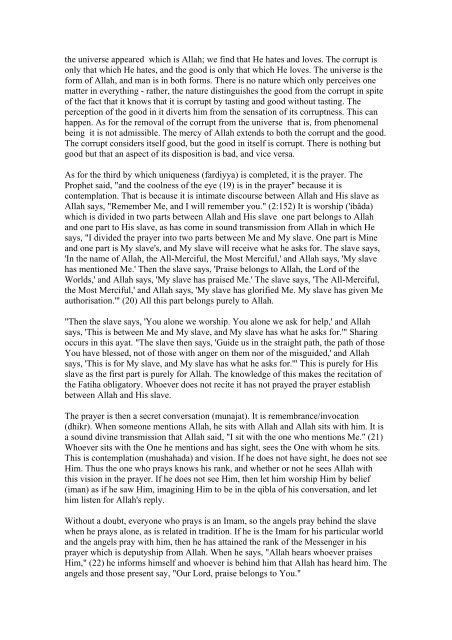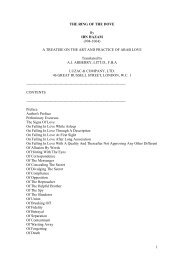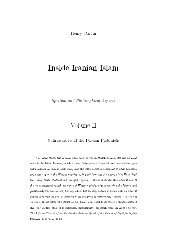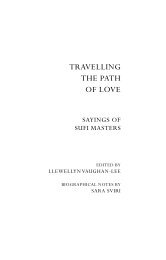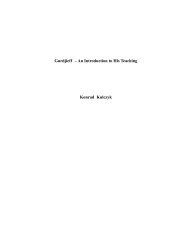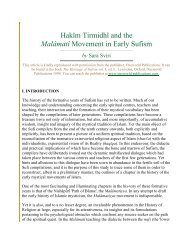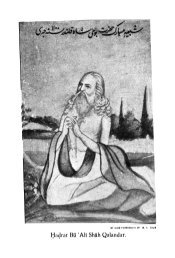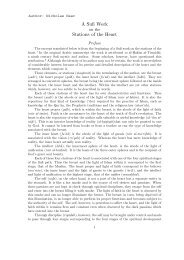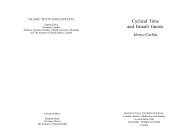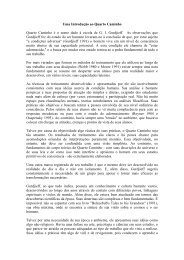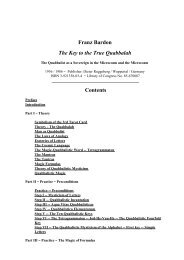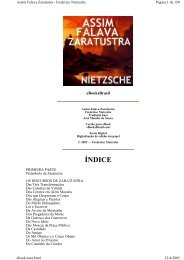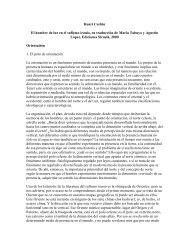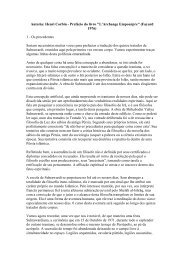Fusus al-Hikam The Seals of Wisdom by Shaykh al ... - ImagoMundi
Fusus al-Hikam The Seals of Wisdom by Shaykh al ... - ImagoMundi
Fusus al-Hikam The Seals of Wisdom by Shaykh al ... - ImagoMundi
You also want an ePaper? Increase the reach of your titles
YUMPU automatically turns print PDFs into web optimized ePapers that Google loves.
the universe appeared which is Allah; we find that He hates and loves. <strong>The</strong> corrupt is<br />
only that which He hates, and the good is only that which He loves. <strong>The</strong> universe is the<br />
form <strong>of</strong> Allah, and man is in both forms. <strong>The</strong>re is no nature which only perceives one<br />
matter in everything - rather, the nature distinguishes the good from the corrupt in spite<br />
<strong>of</strong> the fact that it knows that it is corrupt <strong>by</strong> tasting and good without tasting. <strong>The</strong><br />
perception <strong>of</strong> the good in it diverts him from the sensation <strong>of</strong> its corruptness. This can<br />
happen. As for the remov<strong>al</strong> <strong>of</strong> the corrupt from the universe that is, from phenomen<strong>al</strong><br />
being it is not admissible. <strong>The</strong> mercy <strong>of</strong> Allah extends to both the corrupt and the good.<br />
<strong>The</strong> corrupt considers itself good, but the good in itself is corrupt. <strong>The</strong>re is nothing but<br />
good but that an aspect <strong>of</strong> its disposition is bad, and vice versa.<br />
As for the third <strong>by</strong> which uniqueness (fardiyya) is completed, it is the prayer. <strong>The</strong><br />
Prophet said, "and the coolness <strong>of</strong> the eye (19) is in the prayer" because it is<br />
contemplation. That is because it is intimate discourse between Allah and His slave as<br />
Allah says, "Remember Me, and I will remember you." (2:152) It is worship ('ibâda)<br />
which is divided in two parts between Allah and His slave one part belongs to Allah<br />
and one part to His slave, as has come in sound transmission from Allah in which He<br />
says, "I divided the prayer into two parts between Me and My slave. One part is Mine<br />
and one part is My slave's, and My slave will receive what he asks for. <strong>The</strong> slave says,<br />
'In the name <strong>of</strong> Allah, the All-Merciful, the Most Merciful,' and Allah says, 'My slave<br />
has mentioned Me.' <strong>The</strong>n the slave says, 'Praise belongs to Allah, the Lord <strong>of</strong> the<br />
Worlds,' and Allah says, 'My slave has praised Me.' <strong>The</strong> slave says, '<strong>The</strong> All-Merciful,<br />
the Most Merciful,' and Allah says, 'My slave has glorified Me. My slave has given Me<br />
authorisation.'" (20) All this part belongs purely to Allah.<br />
"<strong>The</strong>n the slave says, 'You <strong>al</strong>one we worship. You <strong>al</strong>one we ask for help,' and Allah<br />
says, 'This is between Me and My slave, and My slave has what he asks for.'" Sharing<br />
occurs in this ayat. "<strong>The</strong> slave then says, 'Guide us in the straight path, the path <strong>of</strong> those<br />
You have blessed, not <strong>of</strong> those with anger on them nor <strong>of</strong> the misguided,' and Allah<br />
says, 'This is for My slave, and My slave has what he asks for.'" This is purely for His<br />
slave as the first part is purely for Allah. <strong>The</strong> knowledge <strong>of</strong> this makes the recitation <strong>of</strong><br />
the Fatiha obligatory. Whoever does not recite it has not prayed the prayer establish<br />
between Allah and His slave.<br />
<strong>The</strong> prayer is then a secret conversation (munajat). It is remembrance/invocation<br />
(dhikr). When someone mentions Allah, he sits with Allah and Allah sits with him. It is<br />
a sound divine transmission that Allah said, "I sit with the one who mentions Me." (21)<br />
Whoever sits with the One he mentions and has sight, sees the One with whom he sits.<br />
This is contemplation (mushahada) and vision. If he does not have sight, he does not see<br />
Him. Thus the one who prays knows his rank, and whether or not he sees Allah with<br />
this vision in the prayer. If he does not see Him, then let him worship Him <strong>by</strong> belief<br />
(iman) as if he saw Him, imagining Him to be in the qibla <strong>of</strong> his conversation, and let<br />
him listen for Allah's reply.<br />
Without a doubt, everyone who prays is an Imam, so the angels pray behind the slave<br />
when he prays <strong>al</strong>one, as is related in tradition. If he is the Imam for his particular world<br />
and the angels pray with him, then he has attained the rank <strong>of</strong> the Messenger in his<br />
prayer which is deputyship from Allah. When he says, "Allah hears whoever praises<br />
Him," (22) he informs himself and whoever is behind him that Allah has heard him. <strong>The</strong><br />
angels and those present say, "Our Lord, praise belongs to You."


